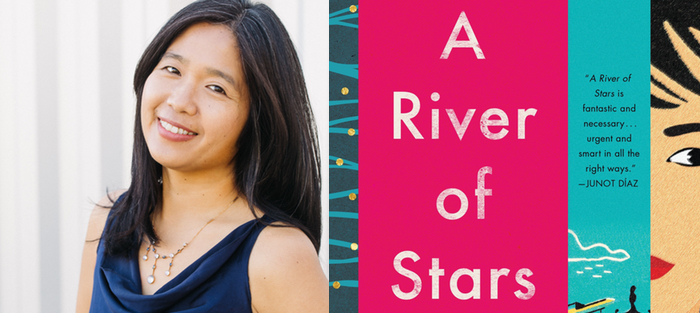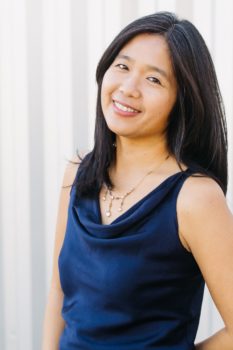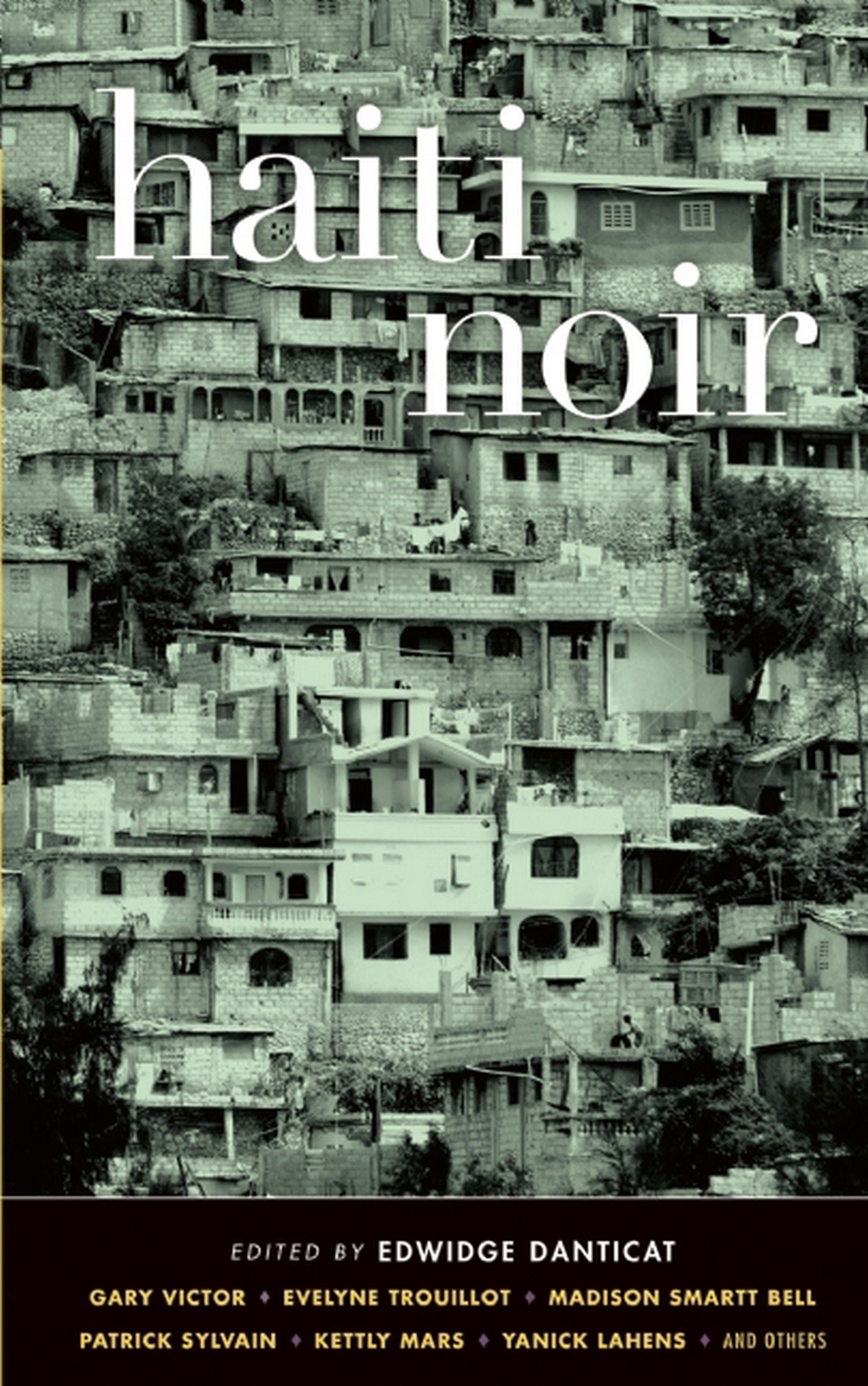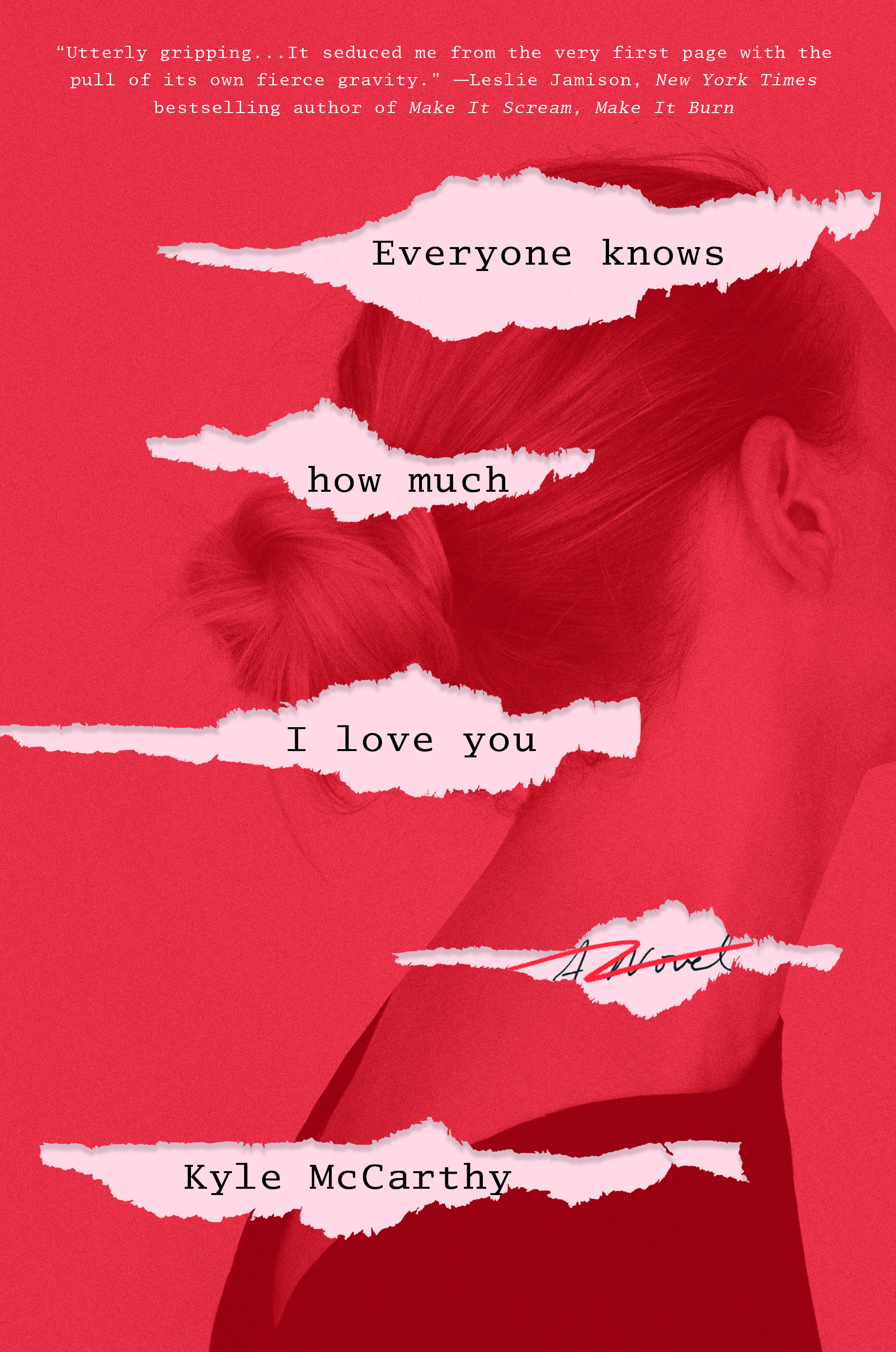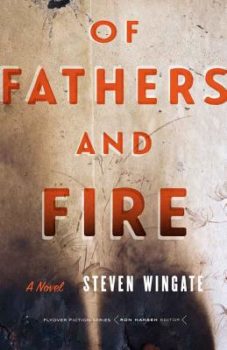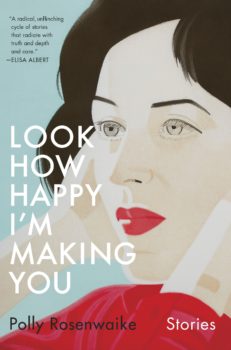Vanessa Hua is an award-winning journalist who finds inspiration for her fiction where the newspaper record ends. In her debut story collection, Deceit and Other Possibilities (Willow Books), which I reviewed previously, several news stories about Asian Americans pretending to be college students to save face got Hua wondering and, later, writing. The resulting short story, “Accepted,” does what journalism rarely can: it made the reader understand who would do such a thing.
The same can be said for Hua’s new book, A River of Stars (Ballantine), a unique look at motherhood through the lens of immigration. Hua was curious about maternity homes, where foreign women wait out the third trimester so that their babies will be born on U.S. soil—and with automatic citizenship. So in the midst of her own pregnancy, Hua started to write the story of Scarlett and Daisy, two women who meet in a maternity home and experience the uncertainty of early motherhood and immigration together.
Hua is now the mother of twin boys, and this interview took place just a week before I was to give birth to my second child. As a result, we really got into the more existential aspects of being a mom and a writer.
Interview:
Carolyn Gan: You are a very accomplished journalist, and I’m wondering what fiction does for you as a writer—or for readers—that journalism can’t.
Vanessa Hua: I’ve mentioned before that non-fiction can have a wider readership in some ways. Yet at the same time, I still think of what I do in journalism as maybe the first draft of history. There’s that study that readers of literary fiction have more empathy because it plants you so deeply into another person’s heart and mind. If someone is picking up a work of fiction, they aren’t necessarily thinking, “Oh, I’m going to learn something today,” like in the way you might think, “Oh, let’s catch up on the news.” When you read fiction, it has a way of acting on your thoughts and emotions that in some ways can be even longer lasting. I think that’s what interests me with fiction in terms of its potential impact on readers. Sure, maybe they are reading it by the pool, but maybe they’ll be thinking about it long after the newspaper ends up at the bottom of a birdcage.
I do want to be careful to say that I love doing both. But fiction gives me an opportunity to have that empathetic leap of imagination, to go where the official record ends. There is going to be a point where there is going to be that gap, and that’s where, as a fiction writer, I find a lot of inspiration to go beyond.
I heard in an interview that many of the stories in Deceit and Other Possibilities were inspired by true events, specifically the one about the woman who was pretending to be a student at Stanford.
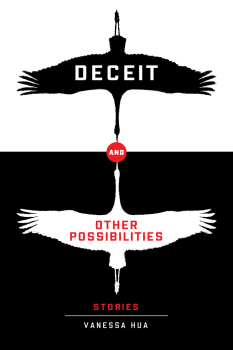 I think for me inspiration isn’t necessarily that I heard one thing and I turned around and wrote another fictional piece. It’s an accumulation of things. I’ve likened it before to dust accumulating in the clouds until it’s heavy enough to start raining. Even in the case of that short story from my collection, it was actually inspired by a number of cases involving Asian Americans who had either conned their way in or failed out and stayed on and felt like they had to lie to their parents. [Those stories accumulated] over a number of years until it made me think about, well, what are the circumstances? What kind of person would do these things? And then I came up with my own fictional version.
I think for me inspiration isn’t necessarily that I heard one thing and I turned around and wrote another fictional piece. It’s an accumulation of things. I’ve likened it before to dust accumulating in the clouds until it’s heavy enough to start raining. Even in the case of that short story from my collection, it was actually inspired by a number of cases involving Asian Americans who had either conned their way in or failed out and stayed on and felt like they had to lie to their parents. [Those stories accumulated] over a number of years until it made me think about, well, what are the circumstances? What kind of person would do these things? And then I came up with my own fictional version.
With my novel, I was pregnant at the time, living in Southern California, when I heard about these maternity homes getting busted. Neighbors were complaining about all these pregnant women coming and going. It made me think about brothels except with pregnant women. I remember reading a news article, and there was this one sentence that really struck me. This neighbor was saying, “This pregnant woman showed up at my doorstep, and I took her to McDonald’s, and then I brought her back home to the maternity center.” It made me think about what it’s like to be pregnant, living so far from home in a situation almost like prison that you are begging the neighbor to take you to McDonald’s so that you don’t have to eat the herbal stews that they keep pushing on you. When I was pregnant, I was fortunate in the sense that people smiled very benevolently upon me. Being pregnant, I felt this expression of goodwill. People seemed to be looking out for me. I thought, “What if I was living in a house with twelve pregnant women? And no one has priority?” I later found in my research that conflicts did arise [in the maternity homes]. You are in this extremely vulnerable, uncomfortable time in your life, and you don’t get to be queen bee. You are just one of many pregnant women. I thought that was really rich territory to mine in fiction.
You were pregnant when you started writing the novel. Did your approach to writing it or your thinking about it change as you progressed in your pregnancy or as you became a mother?
I think before I became pregnant I thought I could totally write from the perspective of a mother, or I could at least attempt it. In my short story collection there are stories about relationships between children and parents except mostly from the child’s point of view. Having written the novel now, I understand things that I didn’t really expect to be thinking about until I became pregnant and a mother. It’s not just what I’ve observed, but it’s this new way of thinking about anything from how they learn language to how they start developing their thoughts about race—so many things that make you question why you think what you think. That’s added to my writing. There are all these things I want to write about, but, of course, I have less time than ever before to write about them.
There are a lot of amazing books about motherhood—The Joy Luck Club comes to mind or Beloved or Little Children—but I couldn’t think of another one that’s specifically about pregnancy or the postpartum period. There are plenty of great non-fiction books that talk about that period of life, though. Why do you think that really important part of life appears less in fiction?
I had the chance to read Lydia Kiesling The Golden State, which is coming out this fall. That’s a lot about motherhood, not so much about pregnancy as the toddler years and about a lot of other things as well. It could speak to the fact that things that women write about like being pregnant are dismissed as being a “mommy issue”—too common or banal. Or it could be that your brain is kind of erased for the first three to six months. That was a challenge with my novel. Stuff had to happen, and I didn’t want them to just be trapped inside 24/7. That is when the bond is established. Maybe it does have to do with it being devalued as an experience worthy of interrogation.
With my first newborn, I watched six seasons of The Walking Dead. I couldn’t figure out why I was so attracted to watching that show, and then I realized so much of it is about family, survival, and mortality. Those are themes that come up a lot in your book for both the mothers and the fathers. They are confronting their own mortality and desire for longevity. Was that your experience as a new parent?
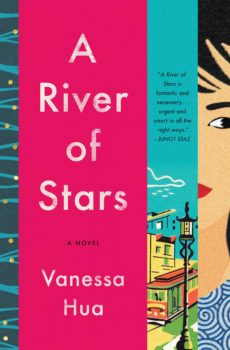 I used to wonder why the poets from the canon you learn in high school are so preoccupied with mortality. I didn’t think about it at all! It was not the biggest stake in my life. I was fortunately not confronted with my mortality. I was just existing. But before I became pregnant, my Dad was diagnosed with Parkinson’s, and I saw his decline. He did have a chance to meet the twins, but he passed away when they were about eight months old. It was this thing to be in the hospital, seeing him hooked up to tubes, but the twins were so vibrant and squirmy and alive. And they were such a huge comfort during the funeral. He has passed on, but he lived on in them in some ways. At the same thing you think, I wish he’d just lived on. But we take what we have, and that’s our children and our memories. We moved back to my childhood home after he passed away. I still think about him a lot, every day. All of that made its way into my book.
I used to wonder why the poets from the canon you learn in high school are so preoccupied with mortality. I didn’t think about it at all! It was not the biggest stake in my life. I was fortunately not confronted with my mortality. I was just existing. But before I became pregnant, my Dad was diagnosed with Parkinson’s, and I saw his decline. He did have a chance to meet the twins, but he passed away when they were about eight months old. It was this thing to be in the hospital, seeing him hooked up to tubes, but the twins were so vibrant and squirmy and alive. And they were such a huge comfort during the funeral. He has passed on, but he lived on in them in some ways. At the same thing you think, I wish he’d just lived on. But we take what we have, and that’s our children and our memories. We moved back to my childhood home after he passed away. I still think about him a lot, every day. All of that made its way into my book.
Also, I live in Silicon Valley. I used to think all of these tech billionaires invested in longevity research for the benefit of mankind. No! They want to live forever! They have everything, and they want to live forever. I think these are contemporary issues but also timeless issues about mortality. How do we continue on? Is it through culture, or our lineage, or technology?
So, it’s interesting that there aren’t more books about that early stage of parenthood because you really are confronting mortality and life seems so long and so short in that moment.
And I wonder if it’s that people are having kids a little older now. You are a sandwich generation. Your parents are getting older at the same time that you are having kids. You start worrying about things in a way that you never did before. That’s why I’m relieved my twins have each other. Who will remember who I was in my childhood if not for my brother or sister when the older generation is gone?
Speaking of siblings or lack thereof, I wanted to ask you about the legacy of China’s “One Child” policy, which felt like an undercurrent in this book. It made me realize for the first time because that policy was just relaxed a couple years ago that the generation that is having children right now grew up under that policy. They are all, for the most part, only children, especially if they came from poorer families. Do you have any thoughts on how that policy has impacted notions of family?
I mention Mei Fong in my acknowledgements because I read her book One Child. She felt the maternity tourism phenomenon happened because of “One Child.” We have a generation of people who, to make reproductive choices, had to lie or cheat or find a loophole. It seems as reasonable as any other measure you might take for your reproductive freedom to come to the U.S. to have your child. In some cases, people would get IVF and then come to the U.S. so then they could have twins and have two kids.
I’m not an expert, but, from what I’ve read, it’s been interesting to see that now that the policy has relaxed, China is trying to encourage people to have two kids or have children before thirty. What do they call them? Leftover women. “Don’t be an old maid. Get married and have kids.” But the result of their social engineering experiment is that a generation went by where people are used to be only children and are used to having all of the resources directed at only one child. So it might not be so easy to put the brakes on something that has been going on for a generation.
You mentioned lying, cheating, and finding loopholes. They come up in both of your books. In fact, the first line of this book is “Scarlett Chen could keep a secret.” Is that sense of hiding part of human nature or a necessary survival skill specifically for immigrants?
I want to be careful and say that I’m not putting a negative connotation on it. It’s about what it takes to survive in a new country, and immigrants are masters of “faking it until they make it” by virtue of necessity. But it’s a universal trait as well. People have said, “I feel like I could relate to things [in your work]” because people of all backgrounds have felt like outsiders or felt like they needed to find a loophole to get by. It is universal, but I wanted to explore it through the immigrant lens.
It was fun to start reading A River of Stars after Deceit and Other Possibilities because there are so many similarities in the characters and their traits. Some of the names repeat themselves even if the details don’t. Did the stories serve as sketches for the novel, or did you write them simultaneously, and they cross pollinated?
Two of the stories in my collection originally were in my novel. I envisioned at one point the novel switching between different perspectives but always returning to Scarlett. However, in the end that didn’t quite hang together. But I still liked those stories, and they’d been published in literary magazines. They came back to life in my collection. It all happened concurrently. Old Wu is a major minor character in the novel, but he has a standalone short story in the collection. Kingsway Lee, the pop star who flees from Asian, was originally Viann’s lover, but I excised him from the novel. Yet I was still interested in exploring that concept of people in Asia who want to come to the US, and then you have the latter-day children of those immigrants who want to return to Asia. There’s this transnational circular migration that continues to interest me in my work.
There are two mothers in your novel who become part of San Francisco’s Chinatown community. As hard as their lives are, that community really keeps them afloat. Who do you consider to be your community as a writer and as a person?
I belong to many different kinds of communities. At one time, I had three or four writing groups going on. It wasn’t like I was cheating on each writing group, but they each nourished me in different ways. They arose out of different beginnings. They each had a different flavor. I have a karaoke book club of Asian female writers and several of us are moms. We talk writing, we talk books, we talk motherhood. That’s an important community. I’m on an endless text conversation with some of them. I belong to San Francisco Writers’ Grotto, a workspace founded by Po Bronson and Ethan Watters, and there are lots of great writers in that group that have great advice or can boost what you are trying to do. I’m in this email thread of six or seven debut authors. We talk everything from working with publicists to dealing with reviews on Goodreads. Being a parent and having kids at school age, there are the people you love to socialize with, but who you wouldn’t have necessarily met if you weren’t living in the same community and your kids weren’t the same age. But they are important for getting you through the day. There isn’t any one community that I subscribe to, but having different communities means there are different ways that they serve me and I can serve them.
Okay, lighting round if you are up for it. These are questions intended to have one-word or one-sentence answers. Ready?
One person you consider to be a mentor.
Susan Straight.
Last book that you read and loved.
The Incendiaries.
Favorite fiction about parenthood (story or novel).
The Golden State.
One thing that kept you going when writing this book.
My husband.
Most authentic fictional twins.
The Shining.
Advice for writers who are becoming parents.
Be patient and kind with yourself, and make the most use of the time you do have.
Last but not least, success for you means . . .
Having someone I don’t know be touched and moved by my words.
I was very touched by both of your books, and we don’t know each other personally, so I hope you already feel successful. Thanks so much for speaking with me and for your time.

